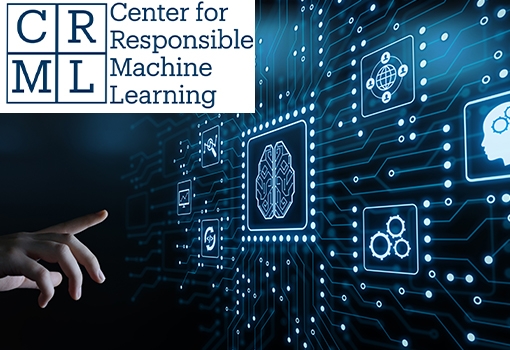Friday, October 16, 2020
With the ongoing COVID-19 pandemic impacting countless aspects of everyday life, understanding the data and models around the virus is extremely important. For months, scientists around the world have shifted their research to generate insights into testing, treatment, forecasting, privacy, and analysis of the coronavirus. Against that backdrop, faculty at UC Santa Barbara’s Center for Responsible Machine Learning invited a distinguished list of scientists to discuss how they are leveraging artificial intelligence (AI) to combat COVID-19. The visitors convened during the center’s second annual Responsible Machine Learning Summit. Hosted on October 9. The one-day virtual event focused on artificial intelligence (AI) and machine learning (ML) for COVID-19.
“It is important to take this opportunity to reflect on what we have achieved, and what we could have done better with responsible AI and machine learning,” said event organizer William Wang, the director of the Center for Responsible Machine Learning and assistant professor of computer science at UCSB. “New AI and machine learning technologies could help us better understand COVID-19 literature, the spread of the pandemic, the effectiveness of policy making, and develop a more stable and efficient vaccine.”

Wang called the summit “a huge success,” adding that 275 unique guests turned up throughout the day on Zoom, nearly quadruple the number of people from last year.
“The feedback has been very positive; many participants appreciated the opportunity to hear from a diverse group of experts on how AI can combat COVID-19,” said Wang. “We were honored to have a full-day program with world-class researchers.”
The speakers and panelists were from such top-tier institutions like Stanford, Columbia, Carnegie Mellon, Washington, UCLA, Illinois, Oregon State, Johns Hopkins, and Oxford. The broad range of topics included epidemiological forecasting, ML for COVID-19 genomic analysis, drugs and vaccines, digital contact tracing, privacy and security, natural language processing, trustworthy AI, and heath data processing and sharing.
The event featured three keynote speakers, Oren Etzioni, Ryan Tibshirani, and Jeannette M. Wing. Etzioni, CEO of the Allen Institute for AI and University of Washington professor emeritus, described the creation of the COVID-19 Open Research Data set (CORD-19) at the Allen Institute for AI, a repository of nearly 30,000 scholarly articles on the coronavirus from around the world. The data set is meant to empower the medical and ML communities to mine data for insights that can help fight COVID-19. Etzioni concluded his talk by saying despite some people raising concerns over privacy and fairness, AI is not evil and could help accelerate progress and unearth answers.
“It’s the absence of AI technologies that is already killing people,” said Etzioni, quoting one of his colleagues, Eric Horvitz. “If we had better AI we could have better therapeutics for COVID-19 sooner. If we had self-driving cars, we could be saving lives on our highways every day. AI is poised to benefit us and to save lives, not to destroy humanity.”
Tibshirani discussed the COVIDcast project, a collaborative effort led by faculty, students, and staff at Carnegie Mellon University, where he is an associate professor. The project curates a diverse set of COVID-related data streams in order to provide validated, verifiable, localized short-term forecasts of the epidemic’s spread. The project uses a wide array of indicators including doctor visits, hospital admissions, symptom surveys conducted on Facebook, and Google search trends. Project leaders have made the data sets freely available to researchers and decision-makers.
“We didn’t build this for ourselves to use alone; we certainly can’t find answers to all of the important questions alone,” said Tibshirani. “We built this to be useful so that others could work on this as well. It’ll take an entire community to find all of the answers to all of the important questions.”
Wing, the Avansessians Director of the Data Science Institute at Columbia University, provided the final talk of the day, focusing on how to make AI systems more trustworthy. She discussed the need to develop a new framework of formal methods and verification techniques to increase society’s trust in AI. Formal methods are a type of mathematical analysis used when developing hardware that is intended to increase the reliability and robustness of a design.
“The AI community is not as familiar with formal methods as perhaps it could or should be. And similarly, the formal-methods community is only beginning to start to think about what would it mean to prove an AI system correct,” said Wing. “One of the reasons why I wanted to present this talk to this audience was to try to bring these communities together.”
Wang praised the speakers for their pioneering research. He said three of the speakers, Luca Ferretti, a senior researcher from the University of Oxford, Jeffrey Kahn, director of the Johns Hopkins Berman Institute of Bioethics, and Elissa Redmiles, a researcher at Microsoft Research, were the first people to use apps to study digital contract tracing, as well as the ethical and privacy considerations associated with it.
Guests also heard from Cynthia Chen, a professor of civil and environmental engineering at the University of Washington; Luca Foschini, co-founder and chief data scientist at Evidation Health; Florence Hudson, executive director of Columbia University’s Northeast Big Data Innovation Hub; John O’Donovan, senior director of machine learning at Teladoc Health; Quanquan Gu, an assistant professor of computer science at UCLA; Xifeng Yan, a professor computer science from UCSB; Liang Huang, an associate professor from Oregon State University and a distinguished scientist at Baidu Research USA; and James Zou, an assistant professor from Stanford University.
Yan, the Venkatesh Narayanamurti Chair at UCSB, worked with Yu-Xiang Wang, an assistant professor of computer science and the Eugene Aas Chair, to develop a novel forecasting model, inspired by AI, to provide timely information at a more localized level. Funded by a grant from the National Science Foundation, they developed an innovative forecasting algorithm and also drew information from the U.S. Census to factor in hyper-local details.
Lynn N. Fitzgibbons, MD, an infectious disease specialist from Cottage Health; Sara Hooker, a Google Brain researcher; Heng Ji, an Amazon Scholar and computer science professor at University of Illinois at Urbana-Champaign; Oliver Morgan, Director of Health Emergency Information and Risk Assessment at the World Health Organization; and Andrew Metz, chief technology officer at AppFolio participated in a panel discussion about AI and COVID-19.
The 2020 Responsible Machine Learning Summit was made possible by sponsors AppFolio and Amazon Alexa, as well as by Privacy Research Sponsor, Evidation Health.
To watch a video recording of event, click here.
Related People:
William Wang 
The Center for Responsible Machine Learning hosted a virtual summit on AI and COVID-19.
